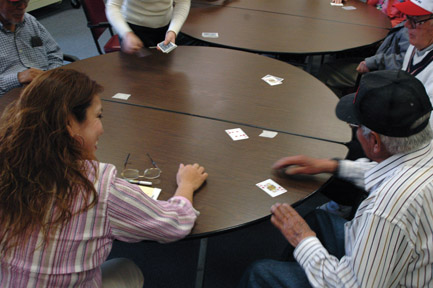
Support group continues, but local day care to stop services due
to state funding cut
An Alzheimer’s Day Care that operates Monday, Wednesday and
Fridays at the Jovenes de Antano senior center in Hollister will
stop services at the end of December due to a cut to the state
funding for such programs.
”
We were able to extend the service through December,
”
said Pauline Valdivia, the director of Jovenes de Antano and a
Hollister city councilwoman.
”
There is no other program in the county that provides respite
for the families [like this.]
”
Support group continues, but local day care to stop services due to state funding cut
An Alzheimer’s Day Care that operates Monday, Wednesday and Fridays at the Jovenes de Antano senior center in Hollister will stop services at the end of December due to a cut to the state funding for such programs.
“We were able to extend the service through December,” said Pauline Valdivia, the director of Jovenes de Antano and a Hollister city councilwoman. “There is no other program in the county that provides respite for the families [like this.]”
The day care program is licensed to work with 12 patients, and for more than 10 years has been open to patients of Alzheimer’s and types of dementia that cause memory loss whose families choose to be the primary caretakers.
Stephanie Correia’s father has attended the Day Care program for at least three years.
“It’s been a real life-saver,” Correia said. “It’s a benefit to both my father and my mother. It gives her free time. Three days a week he is gone from 8:30 a.m. to 3:30 p.m. and it gives my father additional mental stimulation and social interaction. He looks forward to going.”
Correia visited one of the sessions at the day care a few years back.
“I could tell they really enjoyed what they were doing, both the staff and the participants,” she said. “My mother is extremely disappointed that the day care is closing.”
Valdivia explained that the program was started with just $60,000 a year and went up to $80,000. In recent years, the program has seen steady funding cuts from the state.
“It’s been ongoing in terms of funding,” Valdivia said. “Not only with ours but with a lot of programs throughout the state.”
Valdivia recalled that it was a struggle when the program first opened to get clients interested in it.
“People didn’t want neighbors to know that someone had dementia,” she said, of the program, in which clients are picked up by bus at their homes on the mornings they attend the Day Care. “Working with doctors and working with families and because of the education we provide [it became more acceptable.]”
Valdivia and Kim Harman, the program director of the Alzheimer’s Day Care Resource Center, stressed that a once-a-month support group offered to caregivers will continue as will the availability of a resource library at the Hollister Community Center.
Harman, who moved to Hollister from Orange County last spring, has been running the family support group for two months. The group meets the second Thursday of every month from 1:30 p.m. to 3 p.m. at the Community Center.
“People who take care of people always need support,” Harman said. “[Caring for someone] with Alzheimer’s or dementia can be stressful. It can be challenging.”
Harman and a sister cared for her grandmother while her grandmother had Alzheimer’s, and Harman has worked with seniors in many capacities from in-home support to hospice care.
“Having to repeat the same thing 10 times can be frustrating to a certain degree,” she said of her own experiences with Alzheimer’s and dementia patients. “You need patience.”
Though the job can be challenging, Harman said she has always enjoyed helping people deal with the struggles.
“The hardest part is seeing a family member not being the person they used to be,” Harman said. “As the [disease] progresses personalities can change and they don’t remember like they used to.”
Harman said for some families it can be especially hard to share what is going on with others who are not going through the same thing.
“It becomes a really private thing,” she said. “The family member may have been a pillar of the community, rock solid. Some families don’t want that brought to attention.”
So far, Correia said her father’s illness has progressed gradually.
“He still has his sense of humor,” she said. “He is still very thoughtful and grateful so it’s more of a memory problem. Just his short-term memory is gone. We’ve been very fortunate that way.”
Harman said the families who have attended the support group in the past come in at all different points of the process. Some seek out help when a family member has just been diagnosed, while others need support as a family member becomes more ill. Often, it is the support group members who help as much as the facilitator.
“You see you are not alone,” Harman said. “They want to understand more. They want to vent frustration and fears.”
Harman said the job of caring for someone with Alzheimer’s can be taxing, especially if the job falls to an elderly spouse or other family member.
“If you are already elderly, you don’t want your health to suffer,” she said. “You have to take care of yourself. It can be overwhelming to take care of someone else.”
Some of what Harman can do at the support groups is make suggestions to members about who can help them with the caregiving.
“Part of the focus is helping to see what other choices or possibilities they have,” she said.
They can also explore the option of medication that can slow the progression of Alzheimer’s with a physician.
“Some do take medication and it helps some, but everyone responds differently,” Harman said.
Resources
The Alzheimer’s support group meets the second Thursday of every month from 1:30 p.m. to 3 p.m. Pamphlets and books on Alzheimer’s can also be checked out from a resource library at the Community Center. For more information, call 636-8838.
Alzheimer’s Disease Education and Referral (ADEAR) Center
800-438-4380 (toll-free)
www.nia.nih.gov/Alzheimer’s
A service of the National Institute on Aging (NIA), the ADEAR Center offers information and publications for families, caregivers, and professionals on diagnosis, treatment, patient care, caregiver needs, long-term care, education and training, and research related to AD. Staff members answer telephone, e-mail, and written requests and make referrals to local and national resources. The ADEAR Web site provides free, online publications in English and Spanish; e-mail alert and online Connections newsletter subscriptions; an AD clinical trials database; the AD Library database; and more.
Alzheimer’s Association
800-272-3900 (toll-free)
866-403-3073 (TDD/toll-free)
www.alz.org
Alzheimer’s Foundation of America
866-AFA-8484 (866-232-8484; toll-free)
www.alzfdn.org
Eldercare Locator
800-677-1116 (toll-free)
www.eldercare.gov
Family Caregiver Alliance
800-445-8106 (toll-free)
www.caregiver.org
NIHSeniorHealth
www.nihseniorhealth.gov









